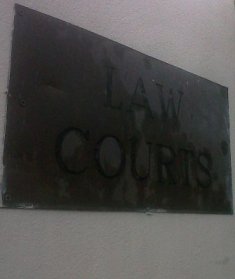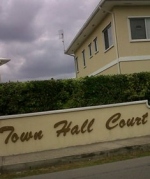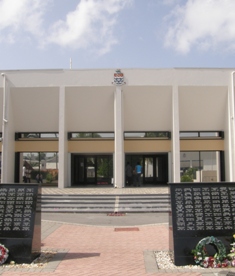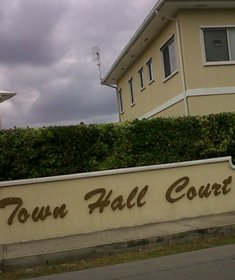Search Results for 'brian borden'

Murder suspect named and remanded in custody
 (CNS): Brian Borden from West Bay was remanded in custody by the Summary Court this week until 24 August when the 27-year-old man from West Bay will appear in Grand Court in connection with the murder of Robert Mackford Bush. Borden is charged with gunning down Bush in a gang related killing in September last year as he sat in his car at the junction of Capt Joe and Osbert Road and Birch Tree Hill, West Bay. Borden has not yet entered a plea to either the murder charge or a second count of possession of an unlicensed firearm. Police said Bush was killed after being shot multiple times by two masked gunmen.
(CNS): Brian Borden from West Bay was remanded in custody by the Summary Court this week until 24 August when the 27-year-old man from West Bay will appear in Grand Court in connection with the murder of Robert Mackford Bush. Borden is charged with gunning down Bush in a gang related killing in September last year as he sat in his car at the junction of Capt Joe and Osbert Road and Birch Tree Hill, West Bay. Borden has not yet entered a plea to either the murder charge or a second count of possession of an unlicensed firearm. Police said Bush was killed after being shot multiple times by two masked gunmen.
The shooting triggered a series of tit-for-tat killings in which three other young men lost their lives and a fourth was seriously injured.
Borden was arrested some eleven months after the shooting following an operation in West Bay conducted by the RCIPS and based on new intelligence. No one else has been charged to date in connection with the death of Andrew Baptise, Preston Rivers and Jason Christian, although police have made several arrests.

Crown witness AWOL at trial
 (CNS): A trial for attempted murder due to start in the Grand Court on Monday morning was adjourned after the crown revealed its key witness and complainant in the case could not be located. The charges of attempted murder and possession of an unlicensed firearm against Justin Ramoon were also dropped and replaced with a single count of possession of an imitation firearm. The case relates to a brawl between the defendant and the complainant, allegedly involving a gun, which took place earlier this year. Ramoon has been in custody since February in relation to the original charges, which his attorney told the court the crown was never in a position to prove.
(CNS): A trial for attempted murder due to start in the Grand Court on Monday morning was adjourned after the crown revealed its key witness and complainant in the case could not be located. The charges of attempted murder and possession of an unlicensed firearm against Justin Ramoon were also dropped and replaced with a single count of possession of an imitation firearm. The case relates to a brawl between the defendant and the complainant, allegedly involving a gun, which took place earlier this year. Ramoon has been in custody since February in relation to the original charges, which his attorney told the court the crown was never in a position to prove.
The court heard that Sven Connor, the complainant in the matter, was wanted by the police in other matters, which likely explained his absence.
Ben Tonner, who was representing Ramoon, asked for the case to proceed as his client had been in custody since February and had been anticipating the trial in order to clear his name. Tonner noted that the crown had indicated it was ready for trial at a preliminary enquiry back in August, which was now “plainly not the case”, he told the court.
The defence attorney said he had no objections to the prosecution’s request to change the charges on the indictment as it was not prejudicial to his client. However, what had been prejudicial was the fact that his client had been charged with a crime for the which the crown never had any evidence.
“My client has been in custody since February on a charge that the crown was never in a position to prove and it should not be charging people on evidence it hopes to get but on the evidence it has,’ Tonner said. He asked the court to proceed with the judge alone trial on Monday, as he said the crown’s situation was not likely to have improved by Wednesday.
The chief justice allowed the application by the prosecution for the adjournment but warned the crown that it had only until Wednesday to make its case as the defendant was in custody.
Brian Borden, who was also due to face trial on Monday in a case of wounding, was discharged after the crown offered no evidence in the case against him. The crown said the complainant no longer wished to proceed with the matter, which had occurred some three years ago.

Men acquitted over attic guns
 (CNS): Full story update: The jury took just over two hours to find Keith Orrett, Brian Borden, Bjorn Ebanks and Keith Montaque not guilty of possession of unlicensed firearms on Wednesday afternoon. Following Justice Charles Quin’s summing up of the evidence and the law, the four women and two men returned to the court with a not guilty verdict at around 2:40pm, after which the judge told the men in the dock they were free to go. Police brought the charges as all four were present when the guns were found in an attic in Town Hall Court and because three of the men could not be excluded from small quantities of mixed DNA found on the firearms.
(CNS): Full story update: The jury took just over two hours to find Keith Orrett, Brian Borden, Bjorn Ebanks and Keith Montaque not guilty of possession of unlicensed firearms on Wednesday afternoon. Following Justice Charles Quin’s summing up of the evidence and the law, the four women and two men returned to the court with a not guilty verdict at around 2:40pm, after which the judge told the men in the dock they were free to go. Police brought the charges as all four were present when the guns were found in an attic in Town Hall Court and because three of the men could not be excluded from small quantities of mixed DNA found on the firearms.

Attorneys close on gun trial
 (CNS): The prosecution and defence teams finally completed their closing arguments this morning at the end of a long and protracted Grand Court firearms trial, which included numerous closed door hearings and a mid-point adjournment. Keith Orrett, Brian Borden, Bjorn Ebanks and Keith Montaque are all charged with possession of unlicensed firearms following a police raid on Orrett’s home where two shotguns were found in the attic. The prosecution says the men are guilty because of DNA found on the weapons, and in the case of Orrett because it was his residence. The defence, however, claims the DNA evidence is weak at best and the crown has not proved possession.
(CNS): The prosecution and defence teams finally completed their closing arguments this morning at the end of a long and protracted Grand Court firearms trial, which included numerous closed door hearings and a mid-point adjournment. Keith Orrett, Brian Borden, Bjorn Ebanks and Keith Montaque are all charged with possession of unlicensed firearms following a police raid on Orrett’s home where two shotguns were found in the attic. The prosecution says the men are guilty because of DNA found on the weapons, and in the case of Orrett because it was his residence. The defence, however, claims the DNA evidence is weak at best and the crown has not proved possession.
During her closing speech on Monday morning (26 April) Trisha Hutchinson, for the prosecution, said that Orrett was guilty as he was the tenant at the premises and he did nothing to prevent the guns from being in his home despite knowing they were there, and the other three are guilty as a result of traces of their DNA being found on one, or in the case of Montaque, both of the weapons.
Hutchinson told the jury that they could put aside claims by the defence that the DNA could be there as a result of contamination as the officers wore gloves. “You should not be troubled by the question of transference," the prosecutor said. “Cast it aside.”
She said it was more than a coincidence that the men were at the house at the time the police found the guns and that their DNA was found on the weapons because they were guilty. She suggested that claims of fear by Orrett were contrived in order to get him out of trouble but that he had control of the premises and was therefore also guilty.
John Fox was the first of the four defence lawyers to present his closing speech on behalf of his client Keith Orrett, reminding the jury he was the only one of the defendants whose DNA had not been found on the guns. He also insisted that fear was a very real factor for his client, who was not in control of the weapons. Fox explained that his client had seen one of the other defendants holding one of the guns and as a result he had every reason to be afraid.
Moreover, Fox said his client had cooperated with the police all through and that he had no reason to tell the police he had ever seen one of the guns on the premises. Fox pointed out it was not an offence for Orrett to be in his house and that the guns were brought there without his knowledge. When he became aware he was not in control. “There is nothing before this court to say that he ever handled these guns," Fox told the jury. “It is laughable to suggest he was in control … the one with the gun had the control.” The attorney pointed out that, having seen one of the firearms, Orrett was in no position to ask anyone to leave as he was afraid for his own life and the lives of his family.
Fox said the prosecution had no evidence that Orrett was in any way connected to the guns and the jury must return a verdict of not guilty.
Defence attorney for Brian Borden told the jury that the DNA samples found on the weapon which supposedly matched his client could very easily be as a result of contamination. Nicholas Hoffman said there was no evidence that his client had ever been in the attic and the statements by Orrett that he had seen him with the gun could not be used against Borden as they were made in circumstances where Borden could not defend himself.
He said the prosecution had offered no evidence as to why the men were connected to the guns when so many other people were at the house that weekend whose DNA was not tested. He said the DNA evidence against his client was a mixed sample that could also match up to 44,000 other people, almost the entire population of the islands, even before the issues of contamination were raised. Hoffman suggested that it was ridiculous that a jury was being asked to decide guilt when there was no evidence against his client.
He said Borden was the last person to be searched before the officers involved then went and handled the guns possibly wearing the same gloves. The case against his client, Hoffman claimed was littered with mistakes — contradictions among witnesses, problems with DNA and many other inadequacies in the quality of the investigation. He told the jury that there was only one verdict, which was not guilty.
Nick Dixie, who spoke on behalf of Bjorn Ebanks, also noted that the only reason why his client was sitting in the dock is because a trace of his DNA had appeared on one of the firearms. Dixie again noted the issue of contamination and transference that had been revealed during the trial and pointed out that his client was excluded from every DNA mark that was tested bar one, where the expert had said in one mixed sample Ebanks could not be excluded. However, Dixie pointed out that the sample could also belong to at least 390 other people, according to the lab results.
He also noted the extent to which the scene in the attic and the house could have been contaminated and that the police officers, far from wearing the forensic crime scene suits used them to put things on. The defence attorney also reminded the jury how the DNA expert witness had confirmed that the mixed samples he was given would be consistent with transference. “This case would be laughable were it not so serious,” Dixie told the jury as he asked them to judge his client fairly.
The last of the defence attorneys to speak for the accused men was Ben Tonner, who took to his feet on Tuesday morning on behalf of Keith Montague. Tonner gave the jury an imaginary scenario in which they found themselves in trouble with the police in similar circumstances to the client and pointed out how they would trust the police to investigate properly.
He said in this case, however, the police had not investigated properly but had made many mistakes. Tonner said the police didn’t change gloves, the crime scene was littered with contamination and cross contaminated during the investigation. “I don’t have time to deal with all the clangers that the police made," he said but pointed out that officers had failed to change gloves between searching his client and the other men before they handled the firearms.
He also noted that the officers did not send other swabs to the lab of the several other people that were present at the house over the weekend before the police arrived there. Tonner also noted that the crime scene investigator had completely missed a clear and obvious hand-print on the air-condition duct right by where the guns were hidden, a print that could have demonstrated without doubt who had actually been in the attic.
Tonner told the jury that not only did crime scene officer, Stephen Best, miss the palm and finger prints (even though he had taken the photograph of it) he had taken no finger prints from the attic or the entrance hatch to it. He said the issue of contamination and transference was very real and despite claims made by the prosecution the jury could not dismiss it.
“The police failed to investigate this properly," Tonner said. “This investigation was an absolute shambles," he told the jury, adding that there was simply not enough evidence to convict his client.
Following the completion of the closing statements, Justice Charles Quin told the jury that he would sum up and offer directions concerning the law for them on Wednesday morning before they would be released to deliberate and consider their verdict.

Crown opens stalled gun trial
 (CNS): Some six weeks after the trial of Keith Orrett, Brian Borden, Bjorn Ebanks and Keith Montaque for possession of unlicensed firearms was adjourned owing to a combination of delays caused over jury problems and issues relating to both the crown and the defence cases, Trisha Hutchinson finally presented the prosecution’s case on Monday morning (12 April). The jury of only six – four women and two men — finally heard the details of the crown’s case that the men were at a house in Town Hall Court, West Bay, when police found two unlicensed loaded shotguns on the afternoon of 7 April 2008.
(CNS): Some six weeks after the trial of Keith Orrett, Brian Borden, Bjorn Ebanks and Keith Montaque for possession of unlicensed firearms was adjourned owing to a combination of delays caused over jury problems and issues relating to both the crown and the defence cases, Trisha Hutchinson finally presented the prosecution’s case on Monday morning (12 April). The jury of only six – four women and two men — finally heard the details of the crown’s case that the men were at a house in Town Hall Court, West Bay, when police found two unlicensed loaded shotguns on the afternoon of 7 April 2008.

Jury troubles continue, trial goes behind closed doors
 (CNS): Following the first day of closed door legal arguments yesterday in the grand court, between the five teams of attorneys in the trial of Keith Orrett, Brian Borden, Bjorn Ebanks and Keith Montaque, the court was also informed that one of the seven members of the jury selected from the streets on Tuesday afternoon could not serve owing to illness. The judge was forced yet again to send his clerk back to the streets to find another talesman. Having secured another member of the jury the court finally arraigned the four men on the charges of possessing unlicensed firearms at an address in West Bay to which they all pleaded not guilty.
(CNS): Following the first day of closed door legal arguments yesterday in the grand court, between the five teams of attorneys in the trial of Keith Orrett, Brian Borden, Bjorn Ebanks and Keith Montaque, the court was also informed that one of the seven members of the jury selected from the streets on Tuesday afternoon could not serve owing to illness. The judge was forced yet again to send his clerk back to the streets to find another talesman. Having secured another member of the jury the court finally arraigned the four men on the charges of possessing unlicensed firearms at an address in West Bay to which they all pleaded not guilty.
Immediately following their pleas and directions to the new jury, from Justice Charles Quin, the five women and two men were dismissed and asked to return on Tuesday 23 February while the attorneys moved into further closed door sessions regarding legal arguments on evidence.
The four men are all currently in custody and have been for almost two years following their arrest in April 2008. According to the particulars of the offence two unlicensed 12 gage shotguns were found by police at a home in Town Hall Court in West Bay while the four men were in the residence at the time. The trial has been postponed and delayed on several occasions as a result of problems securing the services of various experts.

Court runs out of jurors in firearms trial
 (CNS): One of the many challenges facing the Cayman Islands criminal justice system was brought in to sharp focus on Tuesday morning when the Grand Court ran out of jurors from this session’s jury pool before it could make a seven person panel for a firearms trial. A combination of challenges from both the defence team of attorneys and the crown, as well as the jurors’ knowledge of the four defendants and witnesses involved in the particular case, left the court staff trawling the streets of George Town to find enough people to sit for the trial of Keith Orrett, Brian Borden, Bjorn Ebanks and Keith Montaque.
(CNS): One of the many challenges facing the Cayman Islands criminal justice system was brought in to sharp focus on Tuesday morning when the Grand Court ran out of jurors from this session’s jury pool before it could make a seven person panel for a firearms trial. A combination of challenges from both the defence team of attorneys and the crown, as well as the jurors’ knowledge of the four defendants and witnesses involved in the particular case, left the court staff trawling the streets of George Town to find enough people to sit for the trial of Keith Orrett, Brian Borden, Bjorn Ebanks and Keith Montaque.
The four men are all charged with possession of unlicensed firearms after police discovered the weapons in a house in West Bay in 2008. Their jury trial was due to start on Tuesday morning. However, as the court began the process of panelling a seven person jury from the current pool of around fifty people, the entire panel was dismissed after only four people were sworn to serve.
With the four defence attorneys having five challenges each, the prosecution with twenty, plus the fact that so many of the jurors were well acquainted with the defendants or the witnesses, juror after juror was dismissed. With only four people on the panel and the pool exhausted, Justice Charles Quin, who is presiding over the trial, ordered the clerk of court to take to the streets of George Town and find people to serve.
An additional juror who is summoned on the spot to make up for a deficiency in a jury panel is known as a talesman, and on this occasion the court needed to find three. In the first attempt nine people were found in and around the George Town area who met the criteria required for jury service — being on the electoral roll and not having any criminal prosecutions. However, only two women were able to serve from that extra pool, forcing the clerk to hit the streets once again for the final member. After another eight people were rounded up, one man was finally selected and sworn in to make up the necessary seven member jury for a trial of this type of offence.
Each and every Grand Court session the justice system faces a number of problems with jurors, not just because they are afraid to serve because of potential threats but because they are often too familiar with the defendants or the witnesses. Combined with a relatively small electoral roll of just over 15,000, many of whom are still not eligible to serve on a jury due to their type of employment, age, criminal record, or other circumstances, and who are difficult to locate as the addresses have not been updated since Hurricane Ivan, the courts face increasing problems swearing in jurors who can serve impartially.
Although the court bailiff selects around 120 people for the jury panel for each court session from the most recent edition of the register of voters, if the details are not correct it is not always possible for the bailiff to find the people listed. Anyone who has served on any of the last six panels will also be excluded from the new list, and as it is a random procedure designed to ensure impartiality and an even distribution to as many citizens as possible, many people who do not meet the criteria or who have a legitimate reason to be excluded will wind up on the list.
With criminal cases increasing in the Grand Court year on year, the goal of securing enough impartial men and women to ensure the basic human right of any individual charge with a serious crime is becoming even more problematic.